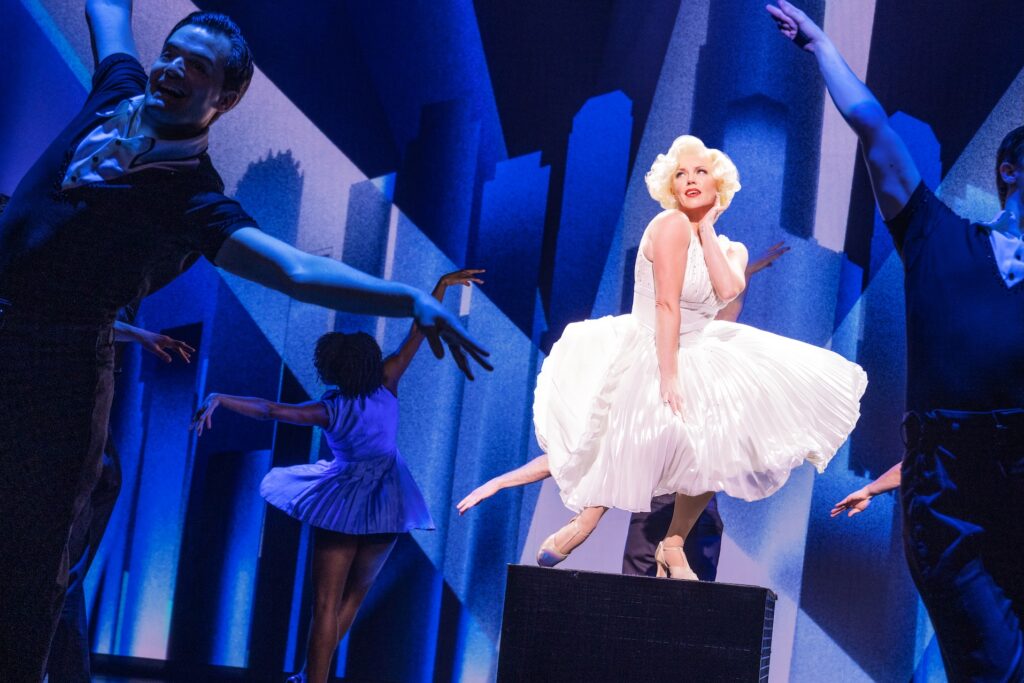At Long Last, NBC’s ‘Smash’ Makes It to Broadway
The stage musical incorporates songs introduced in the TV series, including old-school musical comedy charmers and a couple of fetchingly tender ballads, along with a spanking-new finale, ‘Smash!’

When a film or, less frequently, a television series is adapted into a stage musical, a simple question often arises: Why? Yet with “Smash,” which arrives on Broadway about 12 years after the second and final season of the NBC series of the same name wrapped, one is tempted to ask: What took so long?
Created by a prolific playwright and screenwriter, Theresa Rebeck, TV’s “Smash” followed the making of a Broadway show, and employed top Broadway talent in doing so. A Tony Award nominee, Megan Hilty — who’s almost certain to win a second nod for her current project, “Death Becomes Her,” another screen-to-stage outing — played Ivy Lynn, one of two actresses competing for the role of Marilyn Monroe in a bio-musical called “Bombshell.”
The cast also featured Tony winners Christian Borle and Leslie Odom Jr., and other musical theater favorites such as Brian d’Arcy James (a five-time nominee), Jeremy Jordan, Ann Harada, and Krysta Rodriguez. Joshua Bergasse, whose Broadway credits include an exuberant revival of “On the Town,” provided choreography, and Marc Shaiman and Scott Wittman, a Tony-winning songwriting team that has juggled hit musicals with television and film, contributed tunes.
The stage musical incorporates songs introduced in the series — composed by Mr. Shaiman, with lyrics he co-wrote with Mr. Wittman — including old-school musical comedy charmers and a couple of fetchingly tender ballads, along with a spanking-new finale, “Smash!” Mr. Bergasse is again on board, working with director Susan Stroman, herself a long-celebrated choreographer whose witty, joyful showmanship has both shaped hits (including “The Producers”) and helped redeem less consistent efforts.

A few characters are back as well, among them Ivy, played here by Robyn Hurder, one of Broadway’s true triple threats: Ms. Hurder’s supple voice, fluid dancing, and flair for comedy have earned her a string of principal roles in recent years; watching her lead an original piece in a part that accommodates all those assets is a delight, and should be inspiring to all the talented troupers who are not yet marquee names.
Ivy’s superficially ingenuous rival, Karen, is here too, portrayed by a similarly multi-faceted and nicely wry Caroline Bowman. Co-librettists Bob Martin, another Tony-winning vet currently also represented by the delightful “BOOP! The Musical,” and Rick Elice, whose own numerous credits range from “The Cher Show” to the whimsical “Peter and the Starcatcher,” have also installed new characters, many of them based on figures in the series, and attempted to update the storyline, with mixed results.
The most welcome addition is a new director. On TV, “Bombshell” was helmed by a pompous, preening Brit named Derek, who evoked the horrifying specter of Simon Cowell joining the theater community. Messrs. Martin and Elice have instead given us Nigel, also a diva but comically neurotic, and gay — Derek was a womanizer — and played to the hilt by Brooks Ashmanskas, a Broadway vet who brings both warmth and wit to the role.
In the series, the creators of “Bombshell” had a platonic relationship, whereas in the show the artists are a married couple: Tracy, who longs to make the show more complex and truer to Monroe’s life than the feel-good musical the investors want, and Jerry, who doesn’t want the hassle. Ms. Rodriguez, who played Karen’s roommate onscreen, is smart and likeable as the former, and John Behlmann is drily funny as the latter, especially as the show-within-a-show starts to unravel, driving Jerry to drink.
Some of the trouble stems from Ivy’s decision, after reading a book Tracy gives her, to adopt Monroe’s devotion to Method acting and, accordingly, remain in character as Marilyn offstage. Ivy enlists a coach, a fussy, demanding older woman — Nigel refers to her as “Darth Vader” and “Death” — seemingly based on Paula Strasberg, Lee’s second wife; a perfectly cast Kristine Nielsen gets some laughs in the part.
The most conspicuous newcomer in this “Smash,” though, is Chloe, Nigel’s associate director and choreographer, who has all but given up on her own performing career after repeated rejections. Played by Bella Coppola, a pretty and appealing actress and potent singer, she brings the popular issue of body positivity into the plot: For reasons and by means I won’t disclose, the “Bombshell” team is accused of “body-shaming” — specifically, of not casting someone as Marilyn because she doesn’t fit the role physically.
The injection of this topic seems a little misplaced, as even the most ardent champion of inclusivity might question the notion that a performer cast as Marilyn Monroe, a woman as famous for her particular type of beauty as anyone in history, needn’t evoke that beauty — which didn’t involve being skinny, as Monroe wasn’t. (Neither is Ms. Hurder, who like Ms. Hilty in the series has a voluptuous, glowingly healthy figure.)
Still, as guided by Ms. Stroman, “Smash” is a generally fun ride that should be valued above all else for the same reason the television show was: because it provided gifted artists a high-profile showcase, and steady work.

